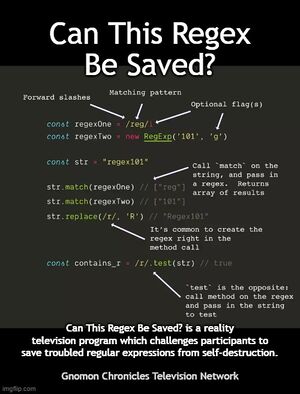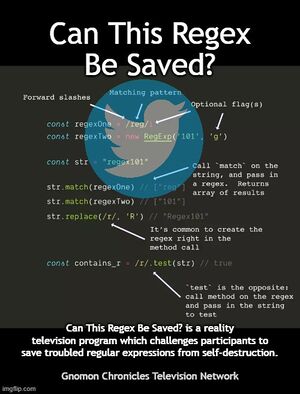Can This Regex Be Saved?: Difference between revisions
Jump to navigation
Jump to search
No edit summary |
No edit summary |
||
| (11 intermediate revisions by the same user not shown) | |||
| Line 1: | Line 1: | ||
'''Can This Regex Be Saved?''' is a [[Reality television (nonfiction)|reality television]] program which challenges participants to save troubled [[Regular expression (nonfiction)|regular expressions]] from self-destruction. | [[File:Can This Regex Be Saved.jpg|thumb|Earliest known poster for '''''Can This Regex Be Saved?'''''.]][[File:Can This Regex Be Saved - Twitter edition.jpg|thumb|'''''Can This Regex Be Saved?''''' (Twitter edition)]] | ||
'''''Can This Regex Be Saved?''''' is a [[Reality television (nonfiction)|reality television]] program which challenges participants to save troubled [[Regular expression (nonfiction)|regular expressions]] from self-destruction. | |||
== In the News == | == In the News == | ||
<gallery> | <gallery> | ||
File:Johnny Got His Code.jpg|link=Johnny Got His Code|'''''[[Johnny Got His Code]]''''' is an anti-war software development thriller film based on the novel by Dalton Trumbo about a military computer programmer (Jake Gyllenhaal) who finds himself trapped in a virtual military-industrial complex. | |||
File:Universal_Turing_machine.svg|link=Is It Turing Complete?|'''''[[Is It Turing Complete?]]''''' is a reality television series which challenges mathematicians to solve an increasingly difficult series of Turing-completeness problems. | |||
</gallery> | </gallery> | ||
| Line 11: | Line 16: | ||
* [[Gnomon algorithm]] | * [[Gnomon algorithm]] | ||
* [[Gnomon Chronicles]] | * [[Gnomon Chronicles]] | ||
* ''[[Is It Turing Complete?]] | |||
* ''[[Johnny Got His Code]]'' | |||
== Nonfiction cross-reference == | == Nonfiction cross-reference == | ||
| Line 17: | Line 24: | ||
* [[Regular expression (nonfiction)]] - a sequence of characters that define a search pattern. Usually this pattern is used by string searching algorithms for "find" or "find and replace" operations on strings, or for input validation. It is a technique developed in theoretical computer science and formal language theory. | * [[Regular expression (nonfiction)]] - a sequence of characters that define a search pattern. Usually this pattern is used by string searching algorithms for "find" or "find and replace" operations on strings, or for input validation. It is a technique developed in theoretical computer science and formal language theory. | ||
External links | == External links == | ||
* [https://en.wikipedia.org/wiki/Regular_expression Regular expression] @ Wikipedia | * [https://en.wikipedia.org/wiki/Regular_expression Regular expression] @ Wikipedia | ||
* [https://regexone.com/ RegexOne] - learn regex through interactive exercises | |||
* [https://www.regextester.com/96289 Regex Tester/Debugger] @ regextester/com | |||
* [https://www.youtube.com/watch?v=sXQxhojSdZM Regular Expressions (RegEx) in 100 Seconds] @ YouTube | |||
=== Social media === | |||
* [https://twitter.com/GnomonChronicl1/status/1725854122174300475 Post] @ Twitter (18 November 2023) | |||
* [https://twitter.com/GnomonChronicl1/status/1662283443156267009 Post] @ Twitter (26 May 2023) | |||
* [https://twitter.com/GnomonChronicl1/status/1575840388971110400 Post] @ Twitter (30 September 2022) | |||
[[Category:Fiction (nonfiction)]] | [[Category:Fiction (nonfiction)]] | ||
[[Category:Crimes against mathematical constants]] | |||
[[Category:Reality television]] | [[Category:Reality television]] | ||
[[Category:Regex (nonfiction)]] | |||
[[Category:Symbols (nonfiction)]] | |||
[[Category:Twitter (nonfiction)]] | |||
{{DISPLAYTITLE:''{{FULLPAGENAME}}''}} | |||
Latest revision as of 05:32, 18 November 2023
Can This Regex Be Saved? is a reality television program which challenges participants to save troubled regular expressions from self-destruction.
In the News
Johnny Got His Code is an anti-war software development thriller film based on the novel by Dalton Trumbo about a military computer programmer (Jake Gyllenhaal) who finds himself trapped in a virtual military-industrial complex.
Is It Turing Complete? is a reality television series which challenges mathematicians to solve an increasingly difficult series of Turing-completeness problems.
Fiction cross-reference
- Crimes against mathematical constants
- Gnomon algorithm
- Gnomon Chronicles
- Is It Turing Complete?
- Johnny Got His Code
Nonfiction cross-reference
- Reality television (nonfiction)
- Regular expression (nonfiction) - a sequence of characters that define a search pattern. Usually this pattern is used by string searching algorithms for "find" or "find and replace" operations on strings, or for input validation. It is a technique developed in theoretical computer science and formal language theory.
External links
- Regular expression @ Wikipedia
- RegexOne - learn regex through interactive exercises
- Regex Tester/Debugger @ regextester/com
- Regular Expressions (RegEx) in 100 Seconds @ YouTube
Social media



